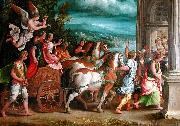Wholesale Oil Painting Reproductions No Minimum and Door to Door! |
|||||||||||
|
|
|||||||||||

|
|||||||||||
|
|
|
||||||||
All Giulio Romano Oil Paintings |
||||||||
|
|
||||||||
|
|
||||||||
|
Artist Introduction: Italian
1492-1546
Giulio Romano was born in Rome. In his native city, as a young assistant in Raphael's studio, he worked on the frescos in the Vatican loggias to designs by Raphael and in Raphael's Stanze in the Vatican painted a group of figures in the Fire in the Borgo (L'incendio di Borgo) fresco. He also collaborated on the decoration of the ceiling of the Villa Farnesina. After the death of Raphael in 1520, he helped complete the Vatican frescoes of the life of Constantine as well as Raphael's Coronation of the Virgin and the Transfiguration in the Vatican. In Rome, Giulio decorated the Villa Madama for Cardinal Giuliano de' Medici, afterwards Clement VII. The crowded Giulio Romano frescoes lack the stately and serene simplicity of his master.
In the Palazzo Te, MantuaAfter the Sack of Rome in 1527 and the death of Leo X, artistic patronage in Rome slackened. Vasari tells how Baldassare Castiglione was delegated by Federico Gonzaga to procure Giulio to execute paintings and architectural and engineering projects for the duchy of Mantua. His masterpiece of architecture and fresco painting in that city is the suburban Palazzo Te, with its famous illusionistic frescos (c. 1525?C1535). He also helped rebuild the ducal palace in Mantua, reconstructed the cathedral, and designed the nearby Church of San Benedetto. Sections of Mantua that had been flood-prone were refurbished under Giulio's direction, and the duke's patronage and friendship never faltered: Giulio's annual income amounted to more than 1000 ducats. His studio became a popular school of art. |
||||||||
|
|
||||||||
|
The Triumph of Titus and Vespasian Painting ID:: 73694 |
1,70 m x 1,20 m
Oil painting on wood
Louvre, Paris
c. 1537-1540
cjr |
|||||||
Height Width |
INS/CM Quality |
|||||||
|
X |
| |||||||
|
|
||||||||
|
Prev Next
|
||||||||
|
|
||||||||
|
Related Paintings to Giulio Romano :. |
||||||||
|
|
||||||||
|
CONTACT US |

